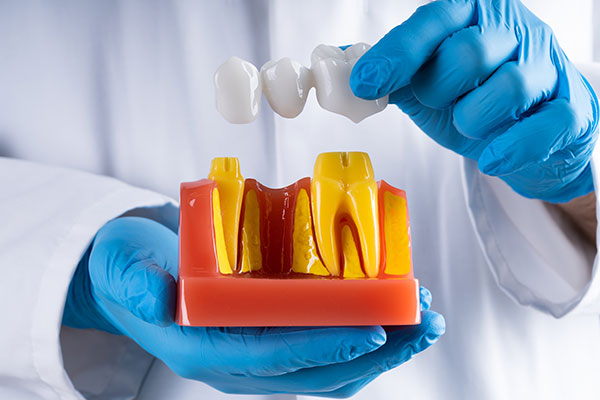Dental Bridge Cost
Is a Dental Bridge in Your Budget?
When it comes to replacing missing teeth, dental bridges are a popular and effective option. Dental bridges fill the gap in your smile, restoring your beautiful smile and oral health. However, some may be worried about the cost.
Our Bakersfield dentist wants to ensure that everyone gets the dental care they need and deserve. If you’re looking for more information about the cost of dental bridges, or other dental treatments you may benefit from, contact our dental office today by calling 661-664-9900.

How Much Does a Dental Bridge Cost?
On average, dental bridges cost between $1,000 and $2,500 per tooth. The cost of dental bridges will vary depending on several factors, including how many teeth need to be replaced. If you require a three-unit bridge to replace a single missing tooth, the total cost can range between $3,000 and $7,500.
Factors That Influence Dental Bridge Cost
The following factors will determine the total cost of your dental bridge treatment:
- Type of Dental Bridge: There are various types of dental bridges, and each one will have different costs. For example, implant-supported bridges tend to cost more than traditional dental bridges.
- Materials: The material chosen for the artificial teeth can significantly affect the price, with gold and all-porcelain generally being more expensive than other options.
- Number of Teeth Being Replaced: The more natural teeth you need to replace, the more the bridge will cost.
- Complexity of the Procedure: If other procedures, such as gum surgery or root canal therapy, are needed before placing a bridge, this will increase the overall cost. The health of your surrounding teeth may also affect the total cost.
- Location: Dental bridge costs vary widely by region, with urban areas often having higher fees than rural ones.
- Dentist’s Experience and Reputation: Highly experienced or specialized dentists might charge more for their dental bridge services.
- Dental Insurance: The amount your insurance covers will affect your out-of-pocket costs. Not all dental insurance plans cover bridges, or they might only cover a portion of the cost.

Cost of Dental Bridges vs. Other Restorative Options
Compared to other restorative dentistry options for replacing missing teeth, dental bridges fall within a moderate price range. Dentures are generally less expensive, with costs ranging from $500 to $2,500 per arch. However, dentures may not provide the same level of stability, comfort, and natural appearance as dental bridges.
Dental implants, on the other hand, are a more expensive alternative, with costs ranging from $1,500 to $6,000 per implant, depending on various factors. While dental implants offer long-term benefits and a high success rate, they often require more extensive surgical procedures and a longer treatment timeline.
Dental Insurance
Dental insurance plans may provide coverage for a portion of the cost of dental bridges, but the extent of dental insurance coverage can vary. Some plans may cover a percentage of the cost, while others may have a fixed maximum annual benefit. Here’s some information to keep in mind when it comes to insurance for a dental bridge procedure:
- Coverage: Insurance policies vary widely in terms of what they cover. Some dental insurance plans may cover a significant portion of the cost of dental bridges, while others might cover only a fraction or none at all.
- Types of Dental Bridges: There are various types of dental bridges (traditional fixed bridge, cantilever dental bridge, Maryland dental bridge, and implant-supported bridge). The type and materials used can affect the cost and the amount of coverage you receive from your insurance.
- Percentage of Coverage: Dental insurance plans often cover dental procedures based on a tiered system and major procedures (dental crowns, bridges, dentures) are often covered at 50%
- Waiting Periods: Some insurance plans have waiting periods for major dental procedures. This means you may need to have the insurance policy for a certain period before you can receive coverage for procedures like dental bridges.
- Annual Maximums: Dental insurance often has an annual maximum benefit. Once your covered treatments reach this amount, the insurance will not pay for additional treatments until the next policy year.
- Pre-treatment Estimates: Before getting a dental bridge, it’s a good idea to request a pre-treatment estimate from your dentist. They can submit a claim to the insurance company detailing the planned procedure, allowing the insurance company to provide an estimate of what they will cover and what your out-of-pocket expense might be.
- Network: If you have a Preferred Provider Organization (PPO) plan or a Health Maintenance Organization (HMO) plan, the amount of coverage you receive might depend on whether your dentist is in-network. Seeing an in-network dentist often results in higher coverage and lower out-of-pocket expenses.

Financing Dental Bridges
Dental Office Payment Plans
Many dental offices offer in-house financing or payment plans. These plans often allow you to pay for your dental work in installments over a specified period. Some dental offices might offer interest-free plans if the amount is paid within a certain timeframe.
Medical Credit Cards
Cards like CareCredit are designed specifically for medical and dental expenses. They may offer promotional periods with 0% interest. Be cautious: If you don’t pay off the balance by the end of the promotional period, you might be retroactively charged a high interest rate from the original purchase date.
Personal Loans
Personal loans can be taken from a bank, credit union, or online lender. They can be used for any purpose, including dental work. Interest rates and terms vary based on your creditworthiness.
Healthcare Installment Loans
Some lenders specialize in loans specifically for medical or dental procedures. These loans can offer fixed interest rates and set repayment terms, making it easy to budget.
Flexible Spending Accounts (FSAs) & Health Savings Accounts (HSAs)
If you have an FSA or HSA through your employer, you can use the pre-tax funds in these accounts to pay for dental procedures. Ensure you know the annual contribution limits and any rules about using the funds.
Dental Schools
Consider having the procedure done at a dental school. While the work is performed by students, they’re supervised by experienced dentists. Dental schools often offer procedures at a reduced cost.
Dental Discount Plans
While not insurance, dental discount plans can provide significant savings on dental procedures, including bridges. For an annual or monthly fee, you can access reduced rates at participating dentists.
Frequently Asked Questions
There may be additional expenses involved with dental bridge treatment, such as dental consultations, X-rays, pre-bridge treatments (like tooth extractions, gum disease treatment, or root canals), and follow-up appointments. Discuss the full treatment plan with your dentist to understand all associated costs.
Yes, some dental schools, community health centers, and charitable organizations offer reduced-cost or sliding-scale fee programs for dental services, including dental bridges. These programs aim to provide affordable dental care to individuals with limited financial means. Research local dental clinics or inquire with your dentist about any available discount programs in your area.
Dentures are a cheaper alternative to a dental bridge. However, dentures require extra maintenance and may not look as natural as a dental bridge. Contact your dentist to discuss your alternative tooth replacement options.
Dental insurance often covers dental bridges, leading to a lower initial expense. However, if finances aren’t a concern and your overall health is good, dental implants could be a preferable choice due to their durability and the fact they don’t harm adjacent teeth.
Make an Informed Decision for Your Smile and Budget
Dental bridges are an effective and aesthetically pleasing option for replacing missing teeth. While the cost of dental bridges can vary, it’s important to consider the long-term benefits they provide. Before making a decision, contact our dental professionals in Bakersfield at 661-664-9900 to schedule your dental bridge consultation.